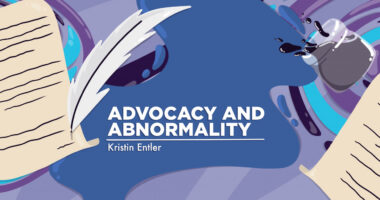Understanding physiological effects of anxiety and chronic illness
My body struggles to relax, because letting my guard down doesn't feel safe

I feel my breath catch in my throat. Short, shallow waves alert my survival brain that something is wrong. My heartbeat quickens, and my hands begin to sweat, with surges of energy coursing through my veins, almost like a cold chill. Every part of my body tenses, and a pit starts to grow in my belly.
It’s just anxiety. Again.
But it’s never just anxiety. There’s a physiological aspect I can’t ignore — a visceral response that hits me suddenly. Then, it becomes a process to pull myself out of that cycle, over and over again.
Anxiety has taken various forms over the years. Growing up with cystic fibrosis (CF) brought a level of anxiety I wasn’t aware of until I became a therapist. Oh, that’s what that is! I always felt anxious during medical testing, surgeries, and doctor appointments, likely because those experiences rarely brought good news.
Before my double-lung transplant eight years ago, my anxiety looked different. When I was out of breath before the surgery, I would panic, fearing I was dying. Thankfully, supplemental oxygen could calm me down quickly. However, in the lead-up to my transplant, I struggled to fall asleep because I was scared I wouldn’t wake up.
Surrounded by threats
After the transplant, I suffered from severe social anxiety. I was terrified of people due to having my immune system suppressed by anti-rejection medications. Every person I encountered felt like a threat that could kill me. I had worked so hard to get a transplant that I didn’t want to take any risks by being in crowds without a mask. Communicating through a mask was also an adjustment, requiring me to speak louder so that others could understand me.
My body has always been on high alert. As I struggled with every breath, my brain received the message that my life was in danger. This heightened anxiety was especially pronounced after several near-death experiences. My body struggled to relax, because letting my guard down didn’t feel safe. After the transplant, this tension escalated due to the foreign sensation of breathing with new lungs, alongside transplant-related health challenges.
It’s often not discussed how intertwined anxiety is with chronic illnesses. It’s normal for me to be anxious when I’m unsure which part of my body needs medical attention. I routinely perform a body scan to assess my symptoms. After facing life-threatening situations like hypoxia, blood clots, and a burst appendix — just to name a few medical emergencies — understandably, every little twinge keeps me hypervigilant, just in case something is wrong. Additionally, when I experience anxiety related to past traumatic events, it becomes challenging not to fear that history will repeat itself during health crises in the present.
I’ve done a significant amount of work to retrain my brain and body to feel safe. Somatic practices have been lifesaving in helping me regulate my nervous system and tone down my hypervigilance. These practices have assisted me during moments of severe anxiety when it’s hard to catch my breath, and a sense of doom envelopes me. Reminders to stay in the present help settle my mind and reassure me that I’m OK.
I’ve come to realize that I may always have some level of anxiety. Trying to eliminate my anxiety has never worked. Instead, leaning into what works for me, even while feeling anxious, has equipped me with the right tools to use at any moment. This has given me hope that I can tackle whatever health challenges come my way.
Note: Cystic Fibrosis News Today is strictly a news and information website about the disease. It does not provide medical advice, diagnosis, or treatment. This content is not intended to be a substitute for professional medical advice, diagnosis, or treatment. Always seek the advice of your physician or other qualified health provider with any questions you may have regarding a medical condition. Never disregard professional medical advice or delay in seeking it because of something you have read on this website. The opinions expressed in this column are not those of Cystic Fibrosis News Today or its parent company, Bionews, and are intended to spark discussion about issues pertaining to cystic fibrosis.









Leave a comment
Fill in the required fields to post. Your email address will not be published.